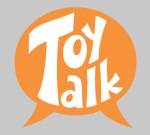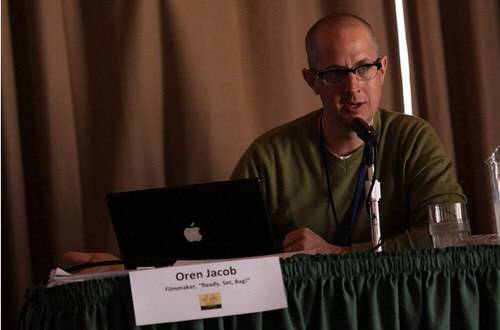Teddy Ruxpin, meet Siri.

Imagine a children’s toy designed by the people behind the Toy Story and Finding Nemo movies but connected to the web and chock full of artificial intelligence. Then add in visual tracking, speech recognition and massive network scalability. It appears that’s what San Francisco startup ToyTalk is building, based on conversations and information available online.
The company is putting together a powerful team of technologists and creatives from Pixar and SRI (makers of Siri) and is being relatively open about what it’s up to. But it has received no press coverage anywhere as far as I can tell. That’s going to change once word gets out about who they are and what they’re doing. The possibilities in both entertainment and education are amazing.
ToyTalk CEO Oren Jacob, photo by Chuck Foxen.

Neilsen announced new numbers yesterday, showing that tablet computers are increasingly being used by children. 70% of US households with both tablets and children under 12 now report that their children use the family tablet computer, up 9% over Q3 of last year.
Imagine the youngest of children using Web-connected toys carrying character-driven chatterbot artificial intelligence programs. If done well, the possibilities for child development, education, language learning and more are awe inspiring to consider. What are the problems that need to be solved? Lovability, connectivity and sufficiently intelligent interactivity. It’s that last one that seems the hardest, the least solved. Perhaps if ToyTalk can pull it off, the company can resolve one of the world’s most damaging resource shortages, the shortage of engaging time and energy for childhood development.
The Brains
ToyTalk CEO Oren Jacob worked at Pixar for 20 years, where he served as Chief Technology Officer. Then he was the Entreprenuer-in-Residence at August Capital. Now he’s assembling a company that includes other ex-Pixar people, a heavy-duty engineer from Internet mega-pipe Akamai and a computer scientist from SRI, the research firm that created the now Apple-owned mobile personal assistant Siri. (Jacob once made a documentary film about competitive grocery bagging; more on him here.)
ToyTalk’s Creative Director Bobby Podesta worked on Pixar movies like A Bug’s Life, Toy Story 2, Monsters Inc., Finding Nemo, The Incredibles and was a Directing Animator on Cars. Podesta is hiring a mobile UI developer and a creative writer who can build out charecter dialogue.
Martin Reddy, the ToyTalk CTO, is a Computer Science PhD with more than 40 published papers and 5 years of experience building geospatial visualization technology at the Artificial Intelligence Center at SRI International, the organization that built Siri.
Now imagine massive data input and output from these toys. James Chalfant, ToyTalk’s Director of Scalability, helped build Akamai, a massive Content Delivery Network that serves up 30% of all the web-based content consumed in the world.
Michael Chann built Pixar’s animation technology and is now a visual tracking software specialist at ToyTalk. Brian Langner is a Carnegie Mellon PhD and now ToyTalk’s “Senior Speech Scientist” specializing in human computer spoken word interaction. Byrne Reese was the Product Manager for Movable Type, one of the world’s first major blogging platforms and is now Head of Customer Development at ToyTalk. Renee Adams, head of operations at ToyTalk, spent years working on logistics and retail operations at Apple.
Got that? We’re talking about children’s toys built by an AI scientist from where Siri was born, that tracks human movement, can interact with spoken words, is connected to the web and mobile by an engineer with a world-beating scalability background, promoted by an early advocate of blog publishing software that changed the world and designed by people behind the most popular children’s movies in history.
That sounds incredible. And maybe a little bit frightening.
Could these be the toys that teach your children multiple languages, that help provide some interactivity to neglected children, that save the next generation from passive consumption of non-interactive broadcast media?
Or will they fall into the Uncanny Valley, seem creepy to adults but desensitize children to the true humanity of living people, ushering in a generation of humans so comfortable with robots that the robots proliferate and ultimately… Well, you can imagine. Perhaps it’s post-humanity that will feel like Elvis’s swinging hips for our generation, so wrong to us but a much-loved part of the future for our children.
Those are the questions I’ll be asking when more information comes out about ToyTalk. The company hasn’t yet responded to my request for an interview. I hope they will soon.

















